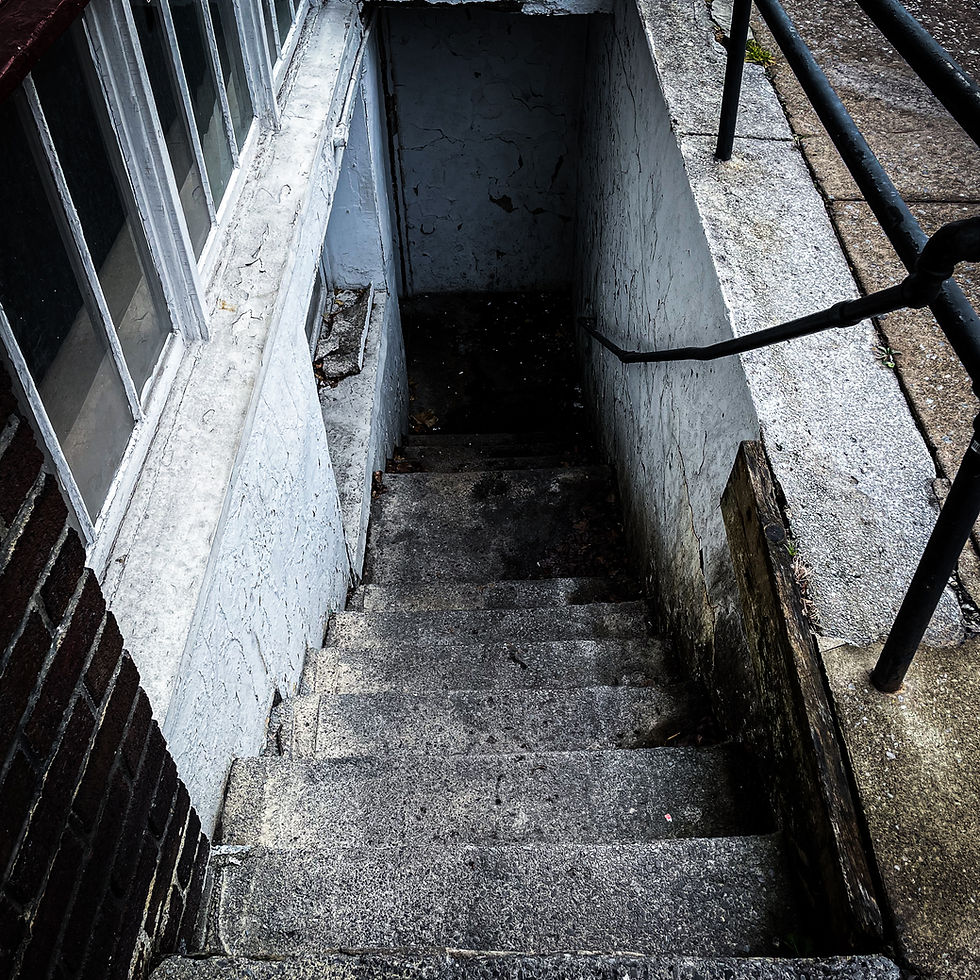Department
- jbrianreed
- Dec 28, 2021
- 4 min read
Everything stays in the boxes. Toys and collectibles, found objects, bric-a-brac—it all stays in the boxes. Clothes and blankets, sucked air-tight in plastic bags, then boxed. News clippings and magazines; baby teeth, fingernails, and locks of hair--all boxed and shelved behind locked doors, down there, in my basement.
I might need it someday. It might need me. And what would I do if I couldn’t find it? Things get lost in clutter. Thoughts turn muddy and prove unreliable. The world needs boxes. And labels. And places for things so they can’t get lost. Ownership connotes responsibility. The thing that’s kept, whatever it is, relies on me to maintain its value, its goodness. Or to keep it from going bad.
Imagine a child in a store, a big store, a department store, everything arranged neatly in squares and rectangles, shiny plastic packages and glossy boxes. The child finds a thing and is lost in fascination, turning away from mother. She pushes her cart unaware and away. I, or the child, snaps out of the trance, alone and wide-eyed in a lustrous, white-washed wilderness, marimba music playing overhead in a warbly echo. If I walk the main row, down the middle, peering up and down each aisle as I pass, eventually I’ll find her. She wouldn’t leave the store without me, right? Or so the child thinks. And after doing this once with no result, doubt sets in. I’ll walk it again, in the off chance that some strange coincidence put mother in a blind spot while crossing from one aisle to another. Just a coincidence, that’s all. She will turn up. But she doesn’t. And the child cries in his hands, sniffling the slobber away on his sleeve.
That’s when the man puts his hand on the back of my neck. It’s a rough, scratchy hand.
And he squeezes. He squeezed. He gripped.
And he led me out of the store to a long blue car with no hubcaps. Once inside, he let go. This was the last time he ever touched me on purpose. All others were incidental, he claimed.
Control, from now forward, was expressed through exactions made in hushed whispers through clenched teeth, all starting with the phrase: “If you ever want to see your mother again….” It reverberated in the mind of a freshly unboxed child newly alone in the out-of-doors.
His house was a wreck, uneven floors, peeling wallpaper. It smelled like animals, dogs or cats, but I never saw them. He left pet food in a dish by the back door. Something crawled in daily for fresh pickings, through a top-hinged pet flap. My head would not fit. I lifted it to see nothing outside but red-brick stairs, slithering with moss and vines.
The floors and walls, dirty. The bath and kitchen, chaos. Anywhere water had touched grew black, gray, and fuzzy—very similar to the skin of the dried-up dead woman stowed in the refrigerator.
Dead for quite a while, I supposed. I remember her eyes folded in on themselves. Her head thrown back, mouth wide, she mimed a scream, a lip-cracking wail, showing all of her pearly but snaggly teeth. It seemed right to keep her there, in the white box, air controlled. She wasn’t my mother, but she would do for now. I’d look at her and imagine lively conversations about galaxies and stars, horse races and sports games, and music, sweet music, mellow and upbeat. A magic box in her throat pumped out the same canned tune from the department store’s overhead. When I gazed too long, I used a dustpan to scoop her ooze from the linoleum in front where it leaked. I put the guck back in there with her, of course.
Locked away in the house with reinforced doors and windows, I lived off white bread and canned meat for some time. The man had me sit on the living room floor, watching news and cartoons, sitcom reruns and game shows. He called me “Junior,” but that wasn’t my name. One time when I asked why he kept me and how long he would do it, he said merely, “I’m proving a point, child. I’m proving my point.” Then a hoarse coughing spell made him pass out, fainted cold. He jerked awake ten seconds later, glass-eyed and discombobulated, he put his hands on the things around him like he’d never seen them before. He saw me and reached but pulled back instead. He smiled, grumbled, slouched down in his chair, and turned up the television until it hurt my ears.
You’re expecting a struggle, a fight to the death. Cop cars and sirens, explosions and men in SWAT gear. I expected that too. And the TV I watched reinforced that every day. But the undoing was gradual, a build-up in my guts, diarrhea turning bloody and rambling conversations with inanimate objects like doorknobs and the fridge lady. I told her I was dying. I thought my insides were turning to sludge like hers. The man found me, eyes turned up and white, seizing in a puddle of mixed juices, mine and the lady’s. I finally came to and followed him to his car in the yard. “You’re no good to me now,” he said. He dropped me at an all-hours clinic, a “doc-in-a-box” some call it.
I survived only to learn that mother had died.
Last year, I finally identified him and put him away. I also found the lady, still in his fridge, mostly bones and flakes, crumbling in my hands. We still talk occasionally; she now fits nicely in my crisper bin. And the man, he’s boxed too, under six inches of concrete on my basement floor. He was alive when I put him there. I hope he still is.
©2021 J. Brian Reed
Originally published on Crystal Lake Entertainment's Patreon site.





Comments